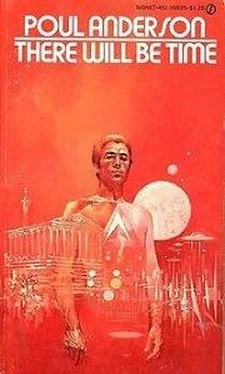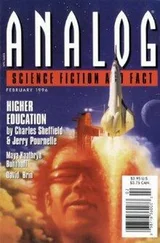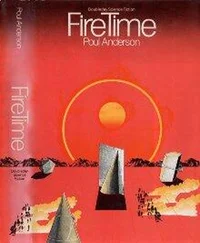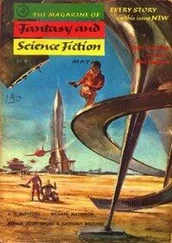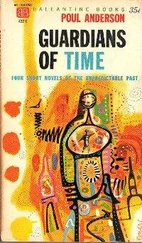Poul Anderson - There Will Be Time
Здесь есть возможность читать онлайн «Poul Anderson - There Will Be Time» весь текст электронной книги совершенно бесплатно (целиком полную версию без сокращений). В некоторых случаях можно слушать аудио, скачать через торрент в формате fb2 и присутствует краткое содержание. Год выпуска: 1972, Издательство: Doubleday, Жанр: Фантастика и фэнтези, на английском языке. Описание произведения, (предисловие) а так же отзывы посетителей доступны на портале библиотеки ЛибКат.
- Название:There Will Be Time
- Автор:
- Издательство:Doubleday
- Жанр:
- Год:1972
- ISBN:нет данных
- Рейтинг книги:5 / 5. Голосов: 1
-
Избранное:Добавить в избранное
- Отзывы:
-
Ваша оценка:
- 100
- 1
- 2
- 3
- 4
- 5
There Will Be Time: краткое содержание, описание и аннотация
Предлагаем к чтению аннотацию, описание, краткое содержание или предисловие (зависит от того, что написал сам автор книги «There Will Be Time»). Если вы не нашли необходимую информацию о книге — напишите в комментариях, мы постараемся отыскать её.
Nominated for Hugo Award for Best Novel in 1973.
There Will Be Time — читать онлайн бесплатно полную книгу (весь текст) целиком
Ниже представлен текст книги, разбитый по страницам. Система сохранения места последней прочитанной страницы, позволяет с удобством читать онлайн бесплатно книгу «There Will Be Time», без необходимости каждый раз заново искать на чём Вы остановились. Поставьте закладку, и сможете в любой момент перейти на страницу, на которой закончили чтение.
Интервал:
Закладка:
There Will Be Time
by Poul Anderson
BE AT EASE. I’m not about to pretend this story is true. First, that claim is a literary convention which went out with Theodore Roosevelt of happy memory. Second, you wouldn’t believe it. Third, any tale signed with my name must stand or fall as entertainment; I am a writer, not a cultist. Fourth, it is my own composition. Where doubts or gaps occur in that mass of notes, clippings, photographs, and recollections of words spoken which was bequeathed me, I have supplied conjectures. Names, places, and incidents have been changed as seemed needful. Throughout, my narrative uses the techniques of fiction.
Finally, I don’t believe a line of it myself. Oh, we could get together, you and I, and ransack official files, old newspapers, yearbooks, journals, and so on forever. But the effort and expense would be large; the results, even if positive, would prove little; we have more urgent jobs at hand; our discoveries could conceivably endanger us.
These pages are merely for the purpose of saying a little about Dr. Robert Anderson. I do owe the book to him. Many of the sentences are his, and my aim throughout has been to capture something of his style and spirit, in memoriam.
You see, I already owed him much more. In what follows, you may recognize certain things from earlier stories of mine. He gave me those ideas, those backgrounds and people, in hour after hour while we sat with sherry and Mozart before a driftwood fire, which is the best kind. I greatly modified them, in part for literary purposes, in part to make the tales my own work. But the core remained his. He would accept no share of payment. “If you sell it,” he laughed, “take Karen out to an extravagant dinner in San Francisco, and empty a pony of akvavit for me.”
Of course, we talked about everything else too. My memories are rich with our conversations. He had a pawky sense of humor. The chances are overwhelming that, in leaving me a boxful of material in the form he did, he was turning his private fantasies into a final, gentle joke.
On the other hand, parts of it are uncharacteristically bleak.
Or are they? A few times, when I chanced to be present with one or two of his smaller grandchildren, I’d notice his pleasure in their company interrupted by moments of what looked like pain. And when last I saw him, our talk turned on the probable shape of the future, and suddenly he exclaimed, “Oh, God, the young, the poor young! Poul, my generation and yours have had it outrageously easy. All we ever had to do was be white Americans in reasonable health, and we got our place in the sun. But now history’s returning to its normal climate here also, and the norm is an ice age.” He tossed off his glass and poured a refill more quickly than was his wont. “The tough and lucky will survive,” he said. “The rest… will have had what happiness was granted them. A medical man ought to be used to that kind of truth, right?” And he changed the subject.
In his latter years Robert Anderson was tall and spare, a bit stoop-shouldered but in excellent shape, which he attributed to hiking and bicycling. His face was likewise lean, eyes blue behind heavy glasses, clothes and white hair equally rumpled. His speech was slow, punctuated by gestures of a pipe if he was enjoying his twice-a-day smoke. His manner was relaxed and amiable. Nevertheless, he was as independent as his cat. “At my stage of life,” he observed, “what was earlier called oddness or orneriness counts as lovable eccentricity. I take full advantage of the fact.” He grinned. “Come your turn, remember what I’ve said.”
On the surface, his life had been calm. He was born in Philadelphia in 1895, a distant relative of my father. Though our family is of Scandinavian origin, a branch has been in the States since the Civil War. But he and I never heard of each other till one of his sons, who happened to be interested in genealogy, happened to settle down near me and got in touch. When the old man came visiting, my wife and I were invited over and at once hit it off with him.
His own father was a journalist, who in 1910 got the editorship of the newspaper in a small upper-Midwestern town (current population 10,000; less then) which I choose to call Senlac. He later described the household as nominally Episcopalian and principally Democratic. He had just finished his premedical studies when America entered the First World War and he found himself in the Army; but he never got overseas. Discharged, he went on to his doctorate and internship. My impression is that meanwhile he exploded a bit, in those hip-flask days. It cannot have been too violent. Eventually he returned to Senlac, hung out his shingle, and married his longtime fiancée.
I think he was always restless. However, the work of general practitioners was far from dull-before progress condemned them to do little more than man referral desks-and his marriage was happy. Of four children, three boys lived to adulthood and are still flourishing.
In 1955 he retired to travel with his wife. I met him soon afterward. She died in 1958 and he sold their house but bought a cottage nearby. Now his journeys were less extensive; he remarked quietly that without Kate they were less fun. Yet he kept a lively interest in life.
He told me of those folk whom I, not he, have called the Maurai, as if it were a fable which he had invented but lacked the skill to make into a story. Some ten years later he seemed worried about me, for no reason I could see, and I in my turn worried about what time might be doing to him. But presently he came out of this. Though now and then an underlying grimness showed through, he was mostly himself again. There is no doubt that he knew what he was doing, for good or ill, when he wrote the clause into his will concerning me.
I was to use what he left me as I saw fit.
Late last year, unexpectedly and asleep, Robert Anderson took his death. We miss him.
—P. A.
1
THE BEGINNING shapes the end, but I can say almost nothing of Jack Havig’s origins, despite the fact that I brought him into the world. On a cold February morning, 1933, who thought of genetic codes, or of Einstein’s work as anything that could ever descend from its mathematical Olympus to dwell among men, or of the strength in lands we supposed were safely conquered? I do remember what a slow and difficult birth he had. It was Eleanor Havig’s first, and she quite young and small. I felt reluctant to do a Caesarian; maybe it’s my fault that she never conceived again by the same husband. Finally the red wrinkled animal dangled safe in my grasp. I slapped his bottom to make him draw his indignant breath, he let the air back out in a wail, and everything proceeded as usual.
Delivery was on the top floor, the third, of our county hospital, which stood at what was then the edge of town. Removing my surgical garb, I had a broad view out a window. To my right, Senlac clustered along a frozen river, red brick at the middle, frame homes on tree-lined streets, grain elevator and water tank rearing ghostly in dawnlight near the railway station. Ahead and to my left, hills rolled wide and white under a low gray sky, here and there roughened by leafless woodlots, fence lines, and a couple of farmsteads. On the edge of sight loomed a darkness which was Morgan Woods. My breath misted the pane, whose chill made my sweaty body shiver a bit.
“Well,” I said half aloud, “welcome to Earth, John Franklin Havig.” His father had insisted on having names ready for either sex. “Hope you enjoy yourself.”
Hell of a time to arrive, I thought. A worldwide depression hanging heavy as winter heaven. Last year noteworthy for the Japanese conquest of Manchuria, bonus march on Washington, Lindbergh kidnapping. This year begun in the same style:
Читать дальшеИнтервал:
Закладка:
Похожие книги на «There Will Be Time»
Представляем Вашему вниманию похожие книги на «There Will Be Time» списком для выбора. Мы отобрали схожую по названию и смыслу литературу в надежде предоставить читателям больше вариантов отыскать новые, интересные, ещё непрочитанные произведения.
Обсуждение, отзывы о книге «There Will Be Time» и просто собственные мнения читателей. Оставьте ваши комментарии, напишите, что Вы думаете о произведении, его смысле или главных героях. Укажите что конкретно понравилось, а что нет, и почему Вы так считаете.
